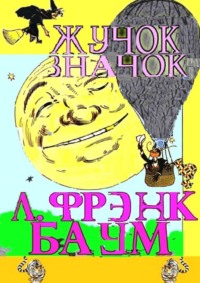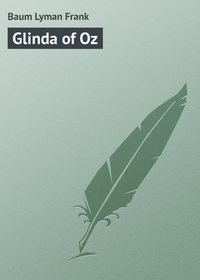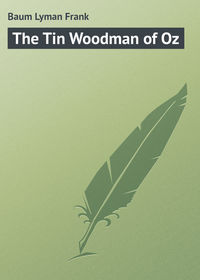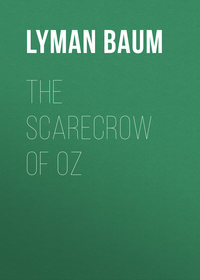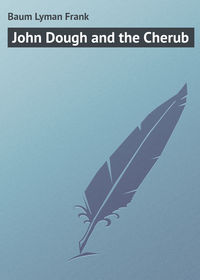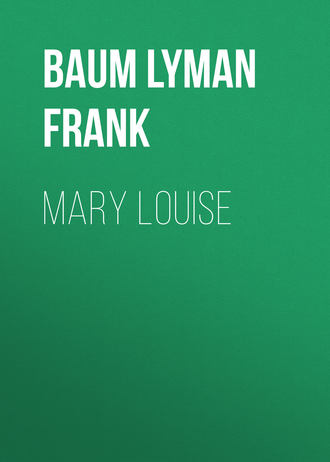 полная версия
полная версияMary Louise
They sat together for an hour in desultory conversation and Agatha Lord certainly interested the two younger girls very much. She was decidedly worldly in much of her gossip but quick to perceive when she infringed the susceptibilities of her less sophisticated companions and was able to turn the subject cleverly to more agreeable channels.
"I've brought my automobile with me," she said, "and, unless you have a car of your own, we will take some rides through the valley together. I mean to drive to Millbank every day for mail."
"There's a car here, which belongs to Mr. Morrison," replied Mary Louise, "but as none of us understands driving it we will gladly accept your invitations to ride. Do you drive your own car?"
"Yes, indeed; that is the joy of motoring; and I care for my car, too, because the hired chauffeurs are so stupid. I didn't wish the bother of servants while taking my 'rest cure,' and so my maid and I are all alone at the Bigbee place."
After a time they went into the house, where Miss Lord was presented to Aunt Hannah, who welcomed their neighbor with her accustomed cordiality. In the den Agatha pounced upon the books and quickly selected two which she begged permission to take home with her.
"This is really a well selected collection," she remarked, eyeing the titles critically. "Where did Mr. Conant find it?"
"At an auction of second-hand junk in New York," explained Irene. "Uncle Peter knows that I love the old-fashioned books best but I'm sure he didn't realize what a good collection this is."
As she spoke, Irene was listlessly running through the leaves of two or three volumes she had not before examined, when in one of them her eye was caught by a yellowed sheet of correspondence paper, tucked among the pages at about midway between the covers. Without removing the sheet she leaned over to examine the fine characters written upon it and presently exclaimed in wondering tones:
"Why, Mary Louise! Here is an old letter about your mother – yes, and here's something about your grandfather, too. How strange that it should be – "
"Let me see it!" cried Mary Louise, eagerly stretching out her hands.
But over her friend's shoulder Irene caught the expression of Agatha Lord – tense, startled, with a gleam of triumph in the dark eyes. It frightened her, that look on the face of one she had deemed a stranger, and it warned her. She closed the book with a little slam of decision and tucked it beside her in her chair.
"No," she said positively, "no one shall see the letter until I've had time to read it myself."
"But what was it about?" asked Mary Louise.
"I don't know, yet; and you're not to ask questions until I DO know," retorted Irene, calmly returning Miss Lord's curious gaze while addressing Mary Louise. "These are my books, you must admit, and so whatever I find in them belongs to me."
"Quite right, my dear," approved Agatha Lord, with her light, easy laugh. She knew that Irene had surprised her unguarded expression and wished to counteract the impression it had caused.
Irene returned the laugh with one equally insincere, saying to her guest:
"Help yourself to whatever books you like, neighbor. Carry them home, read them and return them at your convenience."
"You are exceedingly kind," answered Agatha and resumed her examination of the titles. Mary Louise had not observed the tell-tale expression on Miss Lord's face but she was shrewd enough to detect an undercurrent of ice in the polite phrases passing between her companions. She was consumed with curiosity to know more of the letter which Irene had found in the book but did not again refer to it in the presence of their visitor.
It was not long before Agatha rose to go, a couple of books tucked beneath her arm.
"Will you ride with me to Millbank to-morrow?" she asked, glancing from one face to another.
Mary Louise looked at Irene and Irene hesitated.
"I am not very comfortable without my chair," she said.
"You shall have the rear seat all to yourself, and it is big and broad and comfortable. Mary Louise will ride with me in front. I can easily drive the car up here and load you in at this very porch. Please come!"
"Very well, since you are so kind," Irene decided, and after a few more kindly remarks the beautiful Miss Lord left them and walked with graceful, swinging stride down the path to the road and down the road toward the Bigbee house.
CHAPTER XV
BUB'S HOBBY
When their visitor had departed Mary Louise turned to her friend.
"Now, Irene, tell me about that queer letter," she begged.
"Not yet, dear. I'm sure it isn't important, though it's curious to find such an old letter tucked away in a book Uncle Peter bought at an auction in New York – a letter that refers to your own people, in days long gone by. In fact, Mary Louise, it was written so long ago that it cannot possibly interest us except as proof of the saying that the world's a mighty small place. When I have nothing else to do I mean to read that old epistle from start to finish; then, if it contains anything you'd care to see, I'll let you have a look at it."
With this promise Mary Louise was forced to be content, for she did not wish to annoy Irene by further pleadings. It really seemed, on reflection, that the letter could be of little consequence to anyone. So she put it out of mind, especially as just now they spied Bub sitting on the bench and whittling as industriously as ever.
"Let me go to him first," suggested Irene, with a mischievous smile. "He doesn't seem at all afraid of me, for some reason, and after I've led him into conversation you can join us."
So she wheeled her chair over to where the boy sat. He glanced toward her as she approached the bench but made no movement to flee.
"We've had a visitor," said the girl, confidentially; "a lady who has taken the Bigbee house for the summer."
Bub nodded, still whittling.
"I know; I seen her drive her car up the grade on high," he remarked, feeling the edge of his knife-blade reflectively. "Seems like a real sport – fer a gal – don't she?"
"She isn't a girl; she's a grown woman."
"To me," said Bub, "ev'rything in skirts is gals. The older they gits, the more ornery, to my mind. Never seen a gal yit what's wuth havin' 'round."
"Some day," said Irene with a smile, "you may change your mind about girls."
"An' ag'in," said Bub, "I mayn't. Dad says he were soft in the head when he took up with marm, an' Talbot owned a wife once what tried ter pizen him; so he giv 'er the shake an' come here to live in peace; but Dad's so used to scoldin's thet he can't sleep sound in the open any more onless he lays down beside the brook where it's noisiest. Then it reminds him o' marm an' he feels like he's to home. Gals think they got the men scared, an' sometimes they guess right. Even Miss' Morrison makes Will toe the mark, an' Miss' Morrison ain't no slouch, fer a gal."
This somewhat voluble screed was delivered slowly, interspersed with periods of aimless whittling, and when Irene had patiently heard it through she decided it wise to change the subject.
"To-morrow we are going to ride in Miss Lord's automobile," she remarked.
Bub grunted.
"She says she can easily run it up to our door. Do you believe that!"
"Why not?" he inquired. "Don't Will Morrison have a car? It's over there in the shed now."
"Could it be used?" quietly asked Mary Louise, who had now strolled up behind the bench unperceived.
Bub turned a scowling face to her, but she was looking out across the bluff. And she had broached a subject in which the boy was intensely interested.
"Thet thar car in there is a reg'lar hummer," he asserted, waving the knife in one hand and the stick in the other by way of emphasis. "Tain't much fer looks, ye know, but looks cuts no figger with machinery, s'long's it's well greased. On a hill, thet car's a cat; on a level stretch, she's a jack-rabbit. I've seen Will Morrison take 'er ter Millbank an' back in a hour – jus' one lonesome hour!"
"That must have been in its good days," observed Mary Louise. "The thing hasn't any tires on it now."
"Will takes the tires off ev'ry year, when he goes away, an' puts 'em in the cellar," explained Bub. "They's seven good tires down cellar now; I counted 'em the day afore ye come here."
"In that case," said Mary Louise, "if any of us knew how to drive we could use the car."
"Drive?" said Bub scornfully. "That's nuth'n'."
"Oh. Do you know how?"
"Me? I kin drive any car thet's on wheels. Two years ago, afore Talbot come, I used ter drive Will Morrison over t' Millbank ev'ry week t' catch the train; an' brung the car home ag'in; an' went fer Will when he come back."
"You must have been very young, two years ago," said Irene.
"Shucks. I'm goin' on fifteen this very minnit. When I were 'leven I druv the Higgins car fer 'em an' never hit the ditch once. Young! Wha'd'ye think I am – a KID?"
So indignant had he become that he suddenly rose and slouched away, nor could they persuade him to return.
"We're going to have a lot of fun with that boy, once we learn how to handle him," predicted Irene, when the two girls had enjoyed a good laugh at Bub's expense. "He seems a queer mixture of simplicity and shrewdness."
The next day Agatha Lord appeared in her big touring car and after lifting Irene in and making her quite comfortable on the back seat they rolled gayly away to Millbank, where they had lunch at the primitive restaurant, visited the post-office in the grocery store and amused themselves until the train came in and brought Peter Conant, who was loaded down with various parcels of merchandise Aunt Hannah had ordered.
The lawyer was greatly pleased to find a car waiting to carry him to the Lodge and after being introduced to Miss Lord, whose loveliness he could not fail to admire, he rode back with her in the front seat and left Mary Louise to sit inside with Irene and the packages. Bill Coombs didn't approve of this method of ruining his stage business and scowled at the glittering auto as it sped away across the plain to the mountain.
On this day Miss Lord proved an exceedingly agreeable companion to them all, even Irene forgetting for the time the strange expression she had surprised on Agatha's face at the time she found the letter. Mary Louise seemed to have quite forgotten that letter, for she did not again refer to it; but Irene, who had studied it closely in the seclusion of her own room that very night, had it rather persistently in mind and her eyes took on an added expression of grave and gentle commiseration whenever she looked at Mary Louise's unconscious face.
"It is much more fun," observed Peter Conant at breakfast the nest morning, "to ride to and from the station in a motor car than to patronize Bill Coombs' rickety, slow-going omnibus. But I can't expect our fair neighbor to run a stage line for my express accommodation."
"Will Morrison's motor car is here in the shed," said Mary Louise, and then she told of their conversation with Bub concerning it. "He says he has driven a car ever since he was eleven years old," she added.
"I wondered what that boy was good for," asserted the lawyer, "yet the very last thing I would have accused him of is being a chauffeur."
"Why don't you put on the tires and use the car?" asked Aunt Hannah.
"H-m. Morrison didn't mention the car to me. I suppose he forgot it.
But I'm sure he'd be glad to have us use it. I'll talk with the boy."
Bub was found near the Talbot cottage in the gully. When Mr. Conant and Mary Louise approached him, soon after finishing their breakfast, he was – as usual – diligently whittling.
"They tell me you understand running Mr. Morrison's car," began the lawyer.
Bub raised his eyes a moment to the speaker's face but deemed an answer unnecessary.
"Is that true?" with an impatient inflection.
"Kin run any car," said Bub.
"Very well. Show me where the tires are and we will put them on. I want you to drive me to and from Millbank, hereafter."
Bub retained his seat and whittled.
"Hev ye got a order from Will Morrison, in writin'?" he demanded.
"No, but he will be glad to have me use the machine. He said everything at the Lodge was at my disposal."
"Cars," said Bub, "ain't like other things. A feller'll lend his huntin'-dog, er his knife, er his overcoat; but he's all-fired shy o' lendin' his car. Ef I runned it for ye, Will might blame ME."
Mr. Conant fixed his dull stare on the boy's face, but Bub went on whittling. However, in the boy's inmost heart was a keen desire to run that motor car, as had been proposed. So he casually remarked:
"Ef ye forced me, ye know, I'd jus' hev to do it. Even Will couldn't blame me ef I were forced."
Mr. Conant was so exasperated that the hint was enough. He seized the boy's collar, lifted him off the stump and kicked him repeatedly as he propelled his victim toward the house.
"Oh, Uncle Peter!" cried Mary Louise, distressed; but Peter was obdurate and Bub never whimpered. He even managed to close his knife, between kicks, and slip it into his trousers pocket.
When they came to the garage the lawyer halted, more winded than Bub, and demanded sharply:
"What is needed to put the car in shape to run?"
"Tires, gas'line, oil 'n' water."
"The tires are in the cellar, you say? Get them out or I'll skin you alive."
Bub nodded, grinning.
"Forcin' of me, afore a witness, lets me out," he remarked, cheerfully, and straightway went for the tires.
Irene wheeled herself out and joined Uncle Peter and Mary Louise in watching the boy attach the tires, which were on demountable rims and soon put in place. All were surprised at Bub's sudden exhibition of energy and his deft movements, for he worked with the assurance of a skilled mechanic.
"Now, we need gasoline," said Mr. Conant. "I must order that from Millbank, I suppose."
"Onless ye want to rob Will Morrison's tank," agreed Bub.
"Oh; has he a tank of gasoline here?"
Bub nodded.
"A undergroun' steel tank. I dunno how much gas is in it, but ef ye forced me I'd hev to measure it."
Peter picked up a stick and shook it threateningly, whereat Bub smiled and walked to the rear of the garage where an iron plug appeared just above the surface of the ground. This he unscrewed with a wrench, thrust in a rod and drew it out again.
"'Bout forty gallon," he announced. "Thet's 'nough fer a starter, I guess."
"Then put some of it into the machine. Is there any oil?"
"Plenty oil."
Half an hour later Bub started the engine and rolled the car slowly out of its shed to the graveled drive in the back yard.
"All right, mister," he announced with satisfaction. "I dunno what Will'll say to this, but I kin prove I were forced. Want to take a ride now?"
"No," replied Mr. Conant, "I merely wanted to get the car in shape. You are to take me to the station on Monday morning. Under the circumstances we will not use Morrison's car for pleasure rides, but only for convenience in getting from here to the trains and back. He surely cannot object to that."
Bub seemed disappointed by this decision. He ran the car around the yard two or three times, testing its condition, and then returned it to its shed. Mr. Conant got his rod and reel and departed on a fishing excursion.
CHAPTER XVI
THE STOLEN BOOK
Miss Lord came up to the Lodge that Saturday forenoon and proved so agreeable to Aunt Hannah and the girls that she was invited to stay to lunch. Mr. Conant was not present, for he had put a couple of sandwiches in his pocket and would not return home until dinner-time.
After luncheon they were all seated together on the benches at the edge of the bluff, which had become their favorite resort because the view was so wonderful. Mary Louise was doing a bit of fancy work, Irene was reading and Aunt Hannah, as she mended stockings, conversed in a desultory way with her guest.
"If you don't mind," said Agatha, after a time, "I'll run in and get me a book. This seems the place and the hour for dreaming, rather than gossip, and as we are all in a dreamy mood a good old-fashioned romance seems to me quite fitting for the occasion."
Taking permission for granted, she rose and sauntered toward the house. There was a serious and questioning look in Irene's eyes as they followed the graceful form of Miss Lord, but Mary Louise and Aunt Hannah paid no heed to their visitor's going in to select a book, it seemed so natural a thing for her to do.
It was fully fifteen minutes before Agatha returned, book in hand. Irene glanced at the title and gave a sigh of relief. Without comment their guest resumed her seat and soon appeared to be immersed in her volume. Gradually the sun crossed the mountain and cast a black shadow over the plain below, a shadow which lengthened and advanced inch by inch until it shrouded the landscape spread beneath them.
"That is my sun-dial," remarked Mary Louise, dropping her needlework to watch the shifting scene. "When the shadow passes the Huddle, it's four o'clock; by the time it reaches that group of oaks, it is four-thirty; at five o'clock it touches the creek, and then I know it's time to help Aunt Hannah with the dinner."
Agatha laughed.
"Is it really so late?" she asked. "I see the shadow has nearly reached the brook."
"Oh! I didn't mean – "
"Of course not; but it's time I ran home, just the same. My maid Susan is a perfect tyrant and scolds me dreadfully if I'm late. May I take this book home, Irene? I'll return the others I have borrowed to-morrow."
"To be sure," answered Irene. "I'm rich in books, you know."
When Miss Lord went away the party broke up, for Aunt Hannah was already thinking of dinner and Mary Louise wanted to make one of Uncle Peter's favorite desserts. So Irene wheeled her chair into the house and entering the den began a sharp inspection of the place, having in mind exactly the way it had looked when last she left it. But presently she breathed a sigh of relief and went into her own room, for the den had not been disturbed. She wheeled herself to a small table in a corner of her chamber and one glance confirmed her suspicions.
For half an hour she sat quietly thinking, considering many things that might prove very important in the near future. The chair-girl knew little of life save what she had gleaned from books, but in some ways that was quite equal to personal experiences. At dinner she asked:
"Did you take a book from my room to-day, Mary Louise?"
"No," was the reply; "I have not been in your room since yesterday."
"Nor you, Aunt Hannah?"
"No, my dear. What book is missing?"
"It was entitled 'The Siberian Exile.'"
"Good gracious!" exclaimed Mary Louise. "Wasn't that the book you found the letter in?"
"Yes."
"And you say it is missing?"
"It has mysteriously disappeared."
"Nonsense," said Uncle Peter, who had returned with a fine string of trout. "No one would care to steal an old book, and the thing hasn't legs, you know."
"Nevertheless," said Irene gravely, "it is gone."
"And the letter with it!" added Mary Louise regretfully. "You ought to have let me read it while I could, Irene."
"What letter are you talking about?" asked the lawyer.
"It is nothing important, Uncle Peter," Irene assured him. "The loss of the book does not worry me at all."
Nor did it, for she knew the letter was not in it. And, to avoid further questioning on the part of Mr. Conant, she managed to turn the conversation to less dangerous subjects.
CHAPTER XVII
THE HIRED GIRL
Mr. Conant had just put on a comfortable smoking-jacket and slippers and seated himself in the den, pipe in mouth, when the old-fashioned knocker on the front door of the Lodge began to bang. It banged three times, so Mr. Conant rose and made for the door.
Mrs. Conant and Mary Louise were in the kitchen and Irene was in her own room. The lawyer reflected, with a deprecating glance at his unconventional costume, that their evening caller could be none other than their neighbor, the beautiful Miss Lord, so as he opened the door he regretted that his appearance was not more presentable.
But it was not Miss Lord who stood upon the porch awaiting admittance.
It was a strange girl, who asked in a meek voice:
"Is this Hillcrest Lodge?"
"It is," replied the lawyer.
The girl came in without an invitation, bringing a carpet-bag in one hand and a bundle tied in a newspaper tucked under the other arm. As she stood in the lighted room she looked around inquiringly and said:
"I am Sarah Judd. Where is Mrs. Morrison, please?"
Mr. Conant stood and stared at her, his hands clasped behind his back in characteristic attitude. He could not remember ever having heard of Sarah Judd.
"Mrs. Morrison," he said in his choppy voice, "is in Europe."
The girl stared at him in return, as if stupified. Then she sat down in the nearest chair and continued to stare. Finding her determined on silence, Mr. Conant spoke again.
"The Morrisons are spending the summer abroad. I and my family are occupying the Lodge in their absence. I – eh – eh – I am Mr. Conant, of Dorfield."
The girl sighed drearily. She was quite small, about seventeen years of age and dressed in a faded gingham over which she wore a black cloth coat that was rusty and frayed. A black straw hat, fearfully decorated with red velvet and mussed artificial flowers, was tipped over her forehead. Her features were not bad, but her nose was blotched, her face strongly freckled and her red hair very untidy. Only the mild blue eyes redeemed the unattractive face – eyes very like those of Mary Louise in expression, mused Mr. Conant, as he critically eyed the girl.
"I have come here to work," she said after a long pause, during which she seemed trying to collect her thoughts. "I am Sarah Judd. Mrs. Morrison said I must come here on Saturday, the tenth day of July, to go to work. This is the tenth day of July."
"H-m – h-m; I see. When did Mrs. Morrison tell you that?"
"It was last September."
"Oh; so she hired you a year in advance and didn't tell you, afterward, that she was going abroad?"
"I didn't see her since, sir."
Mr. Conant was perplexed. He went into the kitchen and told Aunt Hannah about it and the good woman came at once to interview Sarah Judd, followed by Mary Louise, who had just finished wiping the dishes.
"This seems very unfortunate for you," began Mrs. Conant, regarding the strange girl with mild interest. "I suppose, when Mrs. Morrison engaged you, she expected to pass the summer at the Lodge, and afterward she forgot to notify you."
Sarah Judd considered this soberly; then nodded her head.
"I've walked all the way from Millbank," she said with another sigh.
"Then you've had nothing to eat!" exclaimed Mary Louise, with ready sympathy. "May I get her something, Aunt Hannah?"
"Of course, my dear."
Both Mr. and Mrs. Conant felt rather embarrassed.
"I regret," said the latter, "that we do not need a maid at present. We do our own housework, you see."
"I have left a good place in Albany to come here," said Sarah, plaintively.
"You should have written to Mrs. Morrison," declared the lawyer, "asking if she still required your services. Many unforeseen things may happen during a period of ten months."
"Mrs. Morrison, she have paid me a month in advance," asserted the girl, in justification. "And she paid me my expenses to come here, too. She said I must not fail her; I should come to the Lodge on the tenth of July and do the work at the Lodge. She did not say she would be here. She did not say you would be here. She told me to come and work, and she paid me a month in advance, so I could give the money to my sister, who needed it then. And I must do as Mrs. Morrison says. I am paid to work at the Lodge and so I must work at the Lodge. I cannot help that, can I?"
The lawyer was a man of experience, but this queer complication astonished him. He exchanged a questioning glance with his wife.
"In any event," said Mrs. Conant, "the girl must stay here to-night, for it would be cruel to ask her to find her way down the mountain in the dark. We will put her in the maid's room, Peter, and to-morrow we can decide what to do with her."


